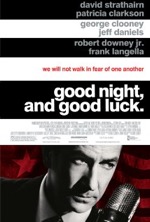Good Night, and Good Luck. (PG)

Starring: David Strathairn
November 2005
“Literate and Intensely Focused Reflection on the McCarthy Era”
This is one of those rare films (and not just because it was shot entirely in B&W) where historical accuracy and artistic license beautifully meld into an engaging narrative so taut, so terse and so poetic that it transcends the medium to become something far grander than just a movie.
Two insights struck me as I took in the experience that is Good Night and Good Luck, director, co-writer and co-star George Clooney’s incisive treatise on the U.S. during the McCarthy Era: 1. The more people change, the more they stay the same. That is to say, it’s easy to play armchair historian and pass judgment on our American forebears, circa early 1950’s, for their rampant hysteria over rumored Communist spies in high governmental positions (Jr. Senator from Wisconsin, Joseph McCarthy, and his minions believed that our country was contaminated by Communists and took it upon themselves to ferret out and/or blacklist said individuals from every strata of society). The names, faces and headlines have changed over the decades, but have we truly evolved past our petty prejudices, bigotry and racial profiling (in the wake of 9-11, for instance)?
2. What happened to our education system? The mode of speech employed by all of the characters, and CBS news reporter Edward R. Murrow (David Strathairn) in particular, is at a far superior level to anything you’d hear in the media today, much less in casual, everyday conversation. Much more than just a list of SAT words, the movie’s dialogue is permeated with abstract concepts, euphemistic jabs, figurative descriptions, satirical quips and quizzical notions. Continually catering to the lowest common denominator has clearly taken a toll on our education system and the citizens of our nation by extension.
Lending the movie a sense of time and place is the preponderance of cigarette smokers; roiling wisps of smoke can be seen throughout the movie and at times the cloud of carcinogens was so dense on-screen that I had to hold my breath for fear of inhaling second-hand smoke. Another historical tidbit presented in the movie (which may be a curiosity to younger viewers) is the much stricter policies regarding fraternization in the 50’s workplace, as is poignantly demonstrated by married couple Joe and Shirley Wershba (Robert Downey, Jr. and Patricia Clarkson).
Social commentary aside (if that’s possible with a movie of this ilk), Good Night and Good Luck is a masterwork that seamlessly blends actual footage of McCarthy with Strathairn’s ardent recitation of Murrow’s actual monologues. Recitation is a heinous disparagement of Strathairn’s scintillating performance—the actor so perfectly captures Murrow’s mien and nuances that he could teach Shirley MacLaine a thing or two about channeling. Anchored by Strathairn and Clooney (who plays intransigent producer, Fred Friendly), the cast is a virtual directory of A-list actors: Jeff Daniels as the reticent office manager, Sig Mickelson, Frank Langella as the beleaguered studio executive, William Paley, Ray Wise as the troubled newsman, Don Hollenbeck, along with the aforementioned Clarkson and Downey Jr., are all pitch perfect under Clooney’s prescient direction.
Although I don’t believe there’s such a thing as a flawless film, Good Night and Good Luck comes exceptionally close to that lofty mark. Moments of stark intensity, like the heated debate over editorializing or the moral dilemma over always posing two sides to every story, are properly balanced with guffaw-inducing sidebars like the exchange between Murrow and Liberace…the only time Murrow is left speechless in the entire movie. Another brilliant touch is Clooney’s use of mock recording sessions from neighboring Columbia Records as musical segues between dramatic sequences; adding some much needed variety, they prevent the movie from collapsing under its own weight.
Serving as bookends for the movie is Murrow’s speech at a banquet thrown in his honor in 1958: in it he warned against complacency—which was already brewing in our country—and that television, as a terribly powerful medium, must not be used for frivolous entertainments. I wonder what Murrow would think about Reality TV?
Whether or not the movie is so honored, Good Night and Good Luck is the best picture of 2005…and good luck to anyone who gets in its way.
Rating: 4